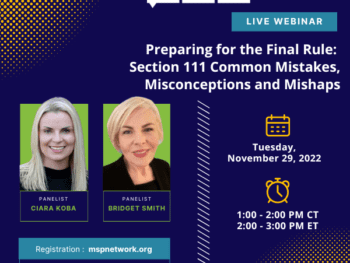
File Intake and Initial Discovery
Claim handlers are on the frontline for effective resolution of liens. This requires them to ensure proper documentation is received and verify its accuracy. It is essential to review and understand the claim’s facts and get things pointed in the right direction regarding Medicare-related matters.
- Verify the employee’s Medicare and Social Security Disability This can be accomplished by running an ISO query. Information can also be obtained from the injured party.
- Confirm the employee’s Medicare information. All Medicare beneficiaries have a unique Medicare beneficiary identifier (MBI). Obtain a copy of the employee’s Medicare card to ensure the accuracy of the information; and
- Obtain necessary Medicare-related authorizations. This can include the CMS Consent to Release authorization that is necessary to obtain Medicare conditional payment information and can be used to submit a Medicare Set-aside later.
There are other necessary steps. This can include using the Social Security Form SSA-3288 authorization to verify SSDI benefits and Medicare information. It is also essential to place Medicare on notice with the correct ICD-10 codes. Never “over-report” these injury codes. Consult with an attorney who specializes in Medicare compliance matters when in doubt.
Pitfalls to Avoid During Discovery
A claim handler needs to engage the defense attorney during the discovery process and ask them to evaluate the possibility of a Medicare Set-aside as the case evolves. Require them to include this analysis in every status update report. It is also essential to monitor conditional payments’ issues and ensure charges are disputed with every update received. Using the Medicare Secondary Payer Recovery Portal (MSPRP) is helpful during this phase of a claim’s life.
- Make sure defense counsel has inquired about the employee’s Medicare status at a deposition and written discovery. If a jurisdiction does not allow for such processes, verify they have corresponded with the employee’s counsel about these matters;
- Do not ignore the possibility the employee is receiving Medicare coverage through a Medicare Advantage Plan. Use tools available from the recently implemented PAID Act to obtain this information; and
- Litigation can be contentious, but cooperation and communication need to be emphasized. Treat everyone with respect and dignity.
When evaluating these issues, make sure part of the conversation includes whether a structured settlement may enhance settlement possibilities. Analysis regarding the recommendation of a Medicare Set-aside is also necessary.
Approaching Settlement Negotiations or Hearing
A claim handler must remain diligent in requesting ongoing analysis regarding Medicare-related compliance matters as a claim moves toward settlement discussions or hearings. This is where a more detailed analysis needs to occur regarding whether a Medicare Set-aside may be recommended as part of the settlement. There also needs to be internal discussions with defense counsel about whether the employee and their attorney will demand it be submitted to Medicare for review and approval. Various additional considerations need to occur:
- What cost drivers might be present in the claim, including the employee’s use of costly prescription medications that tend to drive up the allocation amount;
- The need to include professional administration as part of your demand; and
- It was obtaining a medical cost projection that will include other drivers such as additional physical therapy, injections, or surgery.
Do not delay. Failure to conduct a proper analysis at this point may result in a higher total settlement amount and increased Medicare scrutiny of the settlement.
Case Settlement or Post-Hearing Requirements
Medicare compliance is complicated because some issues, such as the full resolution of conditional payments, are not complete until after payments are made. Do not forget to adequately put together the documentation for a Medicare Set-aside and submit the correct information if it is reviewed and approved by CMS. Consultation with a legal compliance attorney may be necessary.
- Properly notify Medicare of the settlement and ensure all conditional payments are paid. Do not forget about Medicare Advantage Plans;
- Resolve all issues related to the Medicare Set-aside; and
- Coordinate all efforts with the Section 111 Reporting specialist. Assist in the final report related to the Total Payment Obligation to Claimant (TPOC).
Conclusions
Medicare Secondary Payer compliance requires members of the claim management team to take many steps to ensure the resolution of a case. Claim handlers need to be proactive and communicate with the defense attorney and other interested stakeholders. It should also include using an experienced compliance attorney. Failure to evaluate early will often result in mistakes, delays, and costs in resolving claims.
 Author Michael Stack, CEO Amaxx LLC. He is an expert in workers’ compensation cost containment systems and helps employers reduce their workers’ comp costs by 20% to 50%. He works as a consultant to large and mid-market clients, is a co-author of Your Ultimate Guide To Mastering Workers Comp Costs, a comprehensive step-by-step manual of cost containment strategies based on hands-on field experience, and is the founder & lead trainer of Amaxx Workers’ Comp Training Center, which offers the Certified Master of Workers’ Compensation national designation.
Author Michael Stack, CEO Amaxx LLC. He is an expert in workers’ compensation cost containment systems and helps employers reduce their workers’ comp costs by 20% to 50%. He works as a consultant to large and mid-market clients, is a co-author of Your Ultimate Guide To Mastering Workers Comp Costs, a comprehensive step-by-step manual of cost containment strategies based on hands-on field experience, and is the founder & lead trainer of Amaxx Workers’ Comp Training Center, which offers the Certified Master of Workers’ Compensation national designation.
Contact: mstack@reduceyourworkerscomp.com.
Workers’ Comp Roundup Blog: http://blog.reduceyourworkerscomp.com/
©2022 Amaxx LLC. All rights reserved under International Copyright Law.
Do not use this information without independent verification. All state laws vary. You should consult with your insurance broker, attorney, or qualified professional.


























